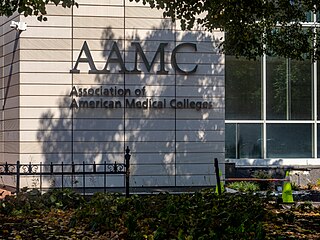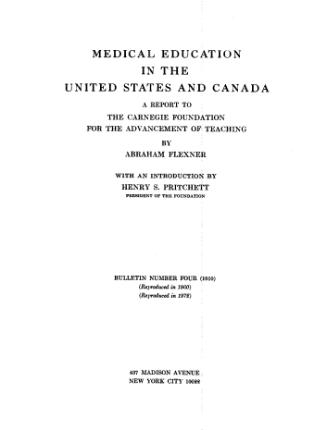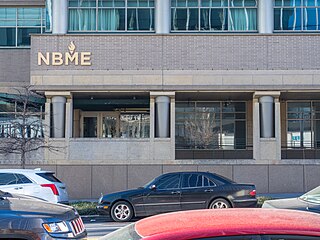Related Research Articles
Osteopathic medicine is a branch of the medical profession in the United States that promotes the practice of science-based medicine, often referred to in this context as allopathic medicine, with a set of philosophy and principles set by its earlier form, osteopathy. Osteopathic physicians (DOs) are graduates of American osteopathic medical colleges and are licensed to practice the full scope of medicine and surgery in all 50 U.S. states. The field is distinct from osteopathic practices offered in nations outside of the U.S.—in which practitioners are generally considered neither parts of core medical staff nor of medicine itself; rather, they are considered alternative medicine practitioners. The other major branch of medicine in the United States is referred to by practitioners of osteopathic medicine as allopathic medicine.
Internal medicine, also known as general internal medicine in Commonwealth nations, is a medical specialty for medical doctors focused on the prevention, diagnosis, and treatment of internal diseases in adults. Medical practitioners of internal medicine are referred to as internists, or physicians in Commonwealth nations. Internists possess specialized skills in managing patients with undifferentiated or multi-system disease processes. They provide care to both hospitalized (inpatient) and ambulatory (outpatient) patients and often contribute significantly to teaching and research. Internists are qualified physicians who have undergone postgraduate training in internal medicine, and should not be confused with "interns", a term commonly used for a medical doctor who has obtained a medical degree but does not yet have a license to practice medicine unsupervised.

The Association of American Medical Colleges (AAMC) is a 501(c)(3) nonprofit organization based in Washington, D.C. that was established in 1876. It represents medical schools, teaching hospitals, and academic and scientific societies, while providing services to its member institutions that include data from medical, education, and health studies, as well as consulting. The AAMC administers the Medical College Admission Test and operates the American Medical College Application Service and the Electronic Residency Application Service. Along with the American Medical Association (AMA), the AAMC co-sponsors the Liaison Committee on Medical Education (LCME), the accrediting body for all U.S. MD-granting medical education programs.

The Flexner Report is a book-length landmark report of medical education in the United States and Canada, written by Abraham Flexner and published in 1910 under the aegis of the Carnegie Foundation. Flexner not only described the state of medical education in North America, but he also gave detailed descriptions of the medical schools that were operating at the time. He provided both criticisms and recommendations for improvements of medical education in the United States.
NYU Grossman School of Medicine is a medical school of New York University (NYU), a private research university in New York City. It was founded in 1841 and is one of two medical schools of the university, the other being the NYU Grossman Long Island School of Medicine. Both are part of NYU Langone Health.

Medical education is education related to the practice of being a medical practitioner, including the initial training to become a physician and additional training thereafter.
The United States Medical Licensing Examination (USMLE) Step 1 is a standardized test that assesses a medical student's knowledge of basic science concepts and their application to clinical medicine. The exam is one of three components required for medical licensure in the United States and is typically taken by students after their second year of medical school.

Medical education in the United States includes educational activities involved in the education and training of physicians in the country, with the overall process going from entry-level training efforts through to the continuing education of qualified specialists.
The Accreditation Council for Graduate Medical Education (ACGME) is the body responsible for accrediting all graduate medical training programs for physicians in the United States. It is a non-profit private council that evaluates and accredits medical residency and internship programs.
Medical school in the United States is a graduate program with the purpose of educating physicians in the undifferentiated field of medicine. Such schools provide a major part of the medical education in the United States. Most medical schools in the US confer upon graduates a Doctor of Medicine (MD) degree, while some confer a Doctor of Osteopathic Medicine (DO) degree. Most schools follow a similar pattern of education, with two years of classroom and laboratory based education, followed by two years of clinical rotations in a teaching hospital where students see patients in a variety of specialties. After completion, graduates must complete a residency before becoming licensed to practice medicine.

The National Board of Medical Examiners (NBME), founded in 1915, is a United States non-profit which develops and manages assessments of student physicians. Known for its role in developing the United States Medical Licensing Examination (USMLE) in partnership with the Federation of State Medical Boards (FSMB), USMLE examinations for medical students and residents are used by medical licensing authorities in the U.S. to help determine qualifications to grant and recognize medical licenses. NBME also creates assessments and materials that are used by medical students, medical educators, practicing physicians, and for state testing of physicians already holding licenses.
In recruitment, the multiple mini-interview (MMI) is an interview format that uses many short independent assessments, typically in a timed circuit, to obtain an aggregate score of each candidate's soft skills. In 2001, the McMaster University Medical School began developing the MMI system, to address two widely recognized problems. First, it has been shown that traditional interview formats or simulations of educational situations do not accurately predict performance in medical school. Secondly, when a licensing or regulatory body reviews the performance of a physician subsequent to patient complaints, the most frequent issues of concern are those of the non-cognitive skills, such as interpersonal skills, professionalism and ethical/moral judgment. Since its formal introduction at McMaster University Medical School in 2004, it has been adopted by medical, dental, pharmacy, and veterinary schools around the world.
The OU School of Community Medicine (OUSCM), located in Tulsa, Oklahoma, is a branch of the University of Oklahoma College of Medicine. It is the first medical school of its kind in the nation. The OU School of Community Medicine is designed to serve the healthcare needs of entire communities, especially vulnerable and underserved populations. OUSCM is guided by the growing need for more physicians focused on serving vulnerable populations, the growing number of people without access to quality health care, and the relatively poor health status of Oklahomans.

The Alliance of Independent Academic Medical Centers (AIAMC) is an American national membership organization of approximately 70 major academic medical centers and health systems concerned with patient care, medical education and research. AIAMC members regard medical education and research as strategic assets in providing patient-centered care; operate independently of medical school ownership or governance while maintaining major medical school affiliations; care for a patient population that mirrors their local communities; and provide teaching and research that is innovative, applicable to practice and community responsive.
An offshore medical school is a medical school that caters "primarily to foreign students, wishing to practice medicine in the US and Canada" according to the World Bank, compared to local schools that focus on their home nation. Such schools are chiefly located in the Caribbean basin, but also includes schools in other locations, such as Mexico and Australia, which run programs that target American students.

The Mayo Clinic Alix School of Medicine (MCASOM), formerly known as Mayo Medical School (MMS), is a research-oriented medical school based in Rochester, Minnesota, with additional campuses in Arizona and Florida. MCASOM is a school within the Mayo Clinic College of Medicine and Science (MCCMS), the education division of the Mayo Clinic. It grants the Doctor of Medicine (M.D.) degree, accredited by the Higher Learning Commission (HLC) and the Liaison Committee on Medical Education (LCME). In November 2018, the school was renamed in honor of a $200 million donation from businessman Jay Alix.
Joseph C. Kolars is an American physician who is the Senior Associate Dean for Education and Global Initiatives, the Josiah Macy Jr. Professor of Health Professions Education, and Professor of Internal Medicine at the University of Michigan Medical School.
Susan E. Skochelak is an American physician and public health professional known for her contributions to medical education and health care innovation.
Health systems science (HSS) is a foundational platform and framework for the study and understanding of how care is delivered, how health professionals work together to deliver that care, and how the health system can improve patient care and health care delivery. It is one of the three pillars of medical education along with the basic and clinical sciences. HSS includes the following core foundational domains: health care structure and process; health system improvement; value in health care; population, public, and social determinants of health; clinical informatics and health technology; and health care policy and economics. It also includes four functional domains: ethics and legal; change agency, management, and advocacy; teaming; and leadership. Systems thinking links all of these domains together. Patient, family, and community are at the center of HSS.
The Master Adaptive Learner (MAL) concept in American medical education refers to a framework designed to prepare U.S. medical students, residents, and medical practitioners to continually adapt and respond to the rapidly evolving landscape of medical knowledge and practice. This metacognitive approach to learning or “learning to learn” is based on self-regulation that fosters the development and use of adaptive expertise in practice. This concept emphasizes the importance of lifelong learning, self-regulation, and adaptability, enabling health professionals to provide high-quality care in an ever-changing environment.
References
- ↑ "Accelerating Change in Medical Education Consortium: 2013-2022". American Medical Association. 2023-05-18. Retrieved 2024-10-01.
- 1 2 3 4 Lomis, Kimberly D.; Santen, Sally A.; Dekhtyar, Michael; Elliott, Victoria Stagg; Richardson, Judee; Hammoud, Maya M.; Hawkins, Richard; Skochelak, Susan E. (July 2021). "The Accelerating Change in Medical Education Consortium: Key Drivers of Transformative Change". Academic Medicine. 96 (7): 979. doi:10.1097/ACM.0000000000003897. ISSN 1040-2446. PMID 33332909.
- 1 2 Skochelak, Susan E.; Lomis, Kimberly D.; Andrews, John S.; Hammoud, Maya M.; Mejicano, George C.; Byerley, Julie (2021-04-08). "Realizing the vision of the Lancet Commission on Education of Health Professionals for the 21st Century: Transforming medical education through the Accelerating Change in Medical Education Consortium". Medical Teacher. 43 (sup2): S1–S6. doi: 10.1080/0142159X.2021.1935833 . ISSN 0142-159X. PMID 34291718.
- ↑ Bhutta, Zulfiqar A; Chen, Lincoln; Cohen, Jordan; Crisp, Nigel; Evans, Tim; Fineberg, Harvey; Frenk, Julio; Garcia, Patricia; Horton, Richard; Ke, Yang; Kelley, Patrick; Kistnasamy, Barry; Meleis, Afaf; Naylor, David; Pablos-Mendez, Ariel (April 2010). "Education of health professionals for the 21st century: a global independent Commission". The Lancet. 375 (9721): 1137–1138. doi:10.1016/S0140-6736(10)60450-3. PMID 20362799.
- ↑ Skochelak, Susan E.; Stack, Steven J. (January 2017). "Creating the Medical Schools of the Future". Academic Medicine: Journal of the Association of American Medical Colleges. 92 (1): 16–19. doi:10.1097/ACM.0000000000001160. ISSN 1938-808X. PMID 27008357.
- ↑ Rappleye, Emily (2016-09-30). "AMA adds 21 schools to consortium to redesign medical education". www.beckershospitalreview.com. Retrieved 2024-10-01.
- 1 2 Santen, Sally A.; Van Rite, Eric; Hammoud, Maya; Lomis, Kimberly D.; Elliott, Victoria Stagg; Heckman, Kevin; Andrews, John S.; Ayala, Sarah B.; Richardson, Judee (October 2023). "Supporting Medical Education Innovation: Evaluation of a Grants Initiative". Academic Medicine. 98 (10): 1159–1163. doi:10.1097/ACM.0000000000005279. ISSN 1040-2446. PMID 37232755.
- 1 2 3 "AMA Announces Awardees of $15 Million Initiative to Further Transform Physician Training". www.nashvillemedicalnews.com. Retrieved 2024-10-01.
- ↑ "Health Systems Science - 9780323694629". US Elsevier Health. Retrieved 2024-10-01.
- ↑ Gonzalo, Jed D.; Baxley, Elizabeth; Borkan, Jeffrey; Dekhtyar, Michael; Hawkins, Richard; Lawson, Luan; Starr, Stephanie R.; Skochelak, Susan (January 2017). "Priority Areas and Potential Solutions for Successful Integration and Sustainment of Health Systems Science in Undergraduate Medical Education". Academic Medicine. 92 (1): 63. doi:10.1097/ACM.0000000000001249. ISSN 1040-2446.
- ↑ Rowe, Rebecca J.; Bahner, Ingrid; Belovich, Andrea N.; Bonaminio, Giulia; Brenneman, Anthony; Brooks, William S.; Chinn, Cassie; El-Sawi, Nehad; Haudek, Sandra B.; Haight, Michele; McAuley, Robert; Slivkoff, Mark D.; Vari, Richard C. (2021-02-01). "Evolution and Revolution in Medical Education: Health System Sciences (HSS)". Medical Science Educator. 31 (1): 291–296. doi:10.1007/s40670-020-01166-x. ISSN 2156-8650. PMC 7668405 . PMID 33224556.
- 1 2 Cutrer, William B.; Miller, Bonnie; Pusic, Martin V.; Mejicano, George; Mangrulkar, Rajesh S.; Gruppen, Larry D.; Hawkins, Richard E.; Skochelak, Susan E.; Moore, Donald E. (January 2017). "Fostering the Development of Master Adaptive Learners: A Conceptual Model to Guide Skill Acquisition in Medical Education". Academic Medicine: Journal of the Association of American Medical Colleges. 92 (1): 70–75. doi:10.1097/ACM.0000000000001323. ISSN 1938-808X. PMID 27532867.
- ↑ "The Master Adaptive Learner - 9780323711111". US Elsevier Health. Retrieved 2024-10-01.
- ↑ Deiorio, Nicole M.; Carney, Patricia A.; Kahl, Leslie E.; Bonura, Erin M.; Juve, Amy Miller (2016-12-01). "Coaching: a new model for academic and career achievement". Medical Education Online. 21: 10.3402/meo.v21.33480. doi:10.3402/meo.v21.33480. ISSN 1087-2981. PMC 5136126 . PMID 27914193.
- 1 2 "Coaching in Medical Education - 9780323847261". US Elsevier Health. Retrieved 2024-10-01.
- ↑ "Newsletter - Teaching Academy | College of Medicine | University of Vermont". www.med.uvm.edu. Retrieved 2024-10-01.
- 1 2 "AMA Academic Coaching Implementation Workshop". Medical Society of Delaware. Retrieved 2024-10-01.
- ↑ Nykiel-Bailey, Sydney. "Coaching in Anesthesiology Residency Programs: A New Frontier". www.anesthesiologynews.com. Retrieved 2024-10-01.
- ↑ "COVID-19 Emergency Declaration". www.fema.gov. 2020-03-14. Retrieved 2024-10-01.
- 1 2 3 Elliott, Victoria Stagg; Hammoud, Maya M.; Richardson, Judee; Santen, Sally A.; Van Rite, Eric; Lomis, Kimberly D. (2024-04-01). "Maintaining Community During Disruption: Lessons From the Accelerating Change in Medical Education Consortium". Academic Medicine: Journal of the Association of American Medical Colleges. 99 (4): 363–369. doi:10.1097/ACM.0000000000005513. ISSN 1938-808X. PMID 37903349.